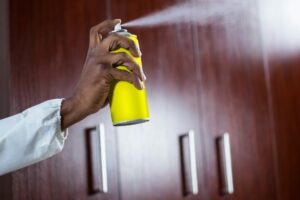Biocides
Pesticides in the living room
What is called pesticides in gardening and agriculture is called biocides in the household. Sometimes they are the same substances in a different application, sometimes they are different substances. Biocides fight pests and nuisances such as insects, mice or rats, but also algae, fungi or bacteria.
Many everyday products such as mosquito sprays or antibacterial cleaning and washing products contain biocides that are intended to harm or kill living organisms. This also poses a risk to the health of the user.
Let us take as an example a substance that is supposed to kill the fly or mosquito by paralysing the insect’s nervous system. This substance does not decide where and on which living being it acts – it is applied in the household and unfolds its effect everywhere. Unfortunately, it is the case that these poisons also have an effect on humans. Due to the dose and the active ingredient, it is not acutely dangerous to health, but in the sum and in the long term it is.
There are other problems with the antimicrobial cleaners and lotions. For one thing, the biocides in the cleaners directly as a substance can cause respiratory problems and nervous system disorders. Secondly, we are not doing our immune system any favours by trying to eliminate all microbes. It reacts with an increased risk of allergies and eczema. In children, you don’t give the immune system the chance to be trained, which is a big risk. It is also the case that no remedy helps against all relevant viruses and bacteria.
Medical studies have shown: Those who handle hygiene spray, disinfectant gel and other antibacterial agents in the household are no better protected against infections than someone who uses normal soaps. On the contrary: the disinfectants also kill the harmless germs. Where the good bacteria live, there is no place for pathogens. Therefore, we should not strive for a disinfected environment. (This does not apply in hospitals, for example, where other pathogens meet weakened people).
Advertising often suggests the opposite – viruses and germs lurk everywhere, so hand disinfection has become a modern gesture through heavy advertising. But cleanliness in itself is not bad. It’s just that disinfectants are not the right means to achieve it. In everyday life, normal soaps, cleaning agents and detergents are quite sufficient.
The influence of biocides goes beyond our own household: if the agents end up in the drain, they hinder the sewage treatment plant, which uses bacteria as cleaning helpers. Some of them are also found in streams and rivers, where they continue to have a disinfecting, i.e. toxic, effect on aquatic organisms.
 What criteria can I use as a guide when shopping to avoid the biocides in cleaners? Caution is advised with products that advertise themselves as ‘superpower’, ‘disinfection’, ‘hygiene’, ‘bactericidal’ or ‘fungicidal’. Products that have been awarded the SDK’s ‘Shop Green’ label offer reliable guidance.
What criteria can I use as a guide when shopping to avoid the biocides in cleaners? Caution is advised with products that advertise themselves as ‘superpower’, ‘disinfection’, ‘hygiene’, ‘bactericidal’ or ‘fungicidal’. Products that have been awarded the SDK’s ‘Shop Green’ label offer reliable guidance.


Biocides
Pesticides in the living room
What is called pesticides in gardening and agriculture is called biocides in the household. Sometimes they are the same substances in a different application, sometimes they are different substances. Biocides fight pests and nuisances such as insects, mice or rats, but also algae, fungi or bacteria.
Many everyday products such as mosquito sprays or antibacterial cleaning and washing products contain biocides that are intended to harm or kill living organisms. This also poses a risk to the health of the user.
Let us take as an example a substance that is supposed to kill the fly or mosquito by paralysing the insect’s nervous system. This substance does not decide where and on which living being it acts – it is applied in the household and unfolds its effect everywhere. Unfortunately, it is the case that these poisons also have an effect on humans. Due to the dose and the active ingredient, it is not acutely dangerous to health, but in the sum and in the long term it is.
There are other problems with the antimicrobial cleaners and lotions. For one thing, the biocides in the cleaners directly as a substance can cause respiratory problems and nervous system disorders. Secondly, we are not doing our immune system any favours by trying to eliminate all microbes. It reacts with an increased risk of allergies and eczema. In children, you don’t give the immune system the chance to be trained, which is a big risk. It is also the case that no remedy helps against all relevant viruses and bacteria.
Medical studies have shown: Those who handle hygiene spray, disinfectant gel and other antibacterial agents in the household are no better protected against infections than someone who uses normal soaps. On the contrary: the disinfectants also kill the harmless germs. Where the good bacteria live, there is no place for pathogens. Therefore, we should not strive for a disinfected environment. (This does not apply in hospitals, for example, where other pathogens meet weakened people).
Advertising often suggests the opposite – viruses and germs lurk everywhere, so hand disinfection has become a modern gesture through heavy advertising. But cleanliness in itself is not bad. It’s just that disinfectants are not the right means to achieve it. In everyday life, normal soaps, cleaning agents and detergents are quite sufficient.
The influence of biocides goes beyond our own household: if the agents end up in the drain, they hinder the sewage treatment plant, which uses bacteria as cleaning helpers. Some of them are also found in streams and rivers, where they continue to have a disinfecting, i.e. toxic, effect on aquatic organisms.
 What criteria can I use as a guide when shopping to avoid the biocides in cleaners? Caution is advised with products that advertise themselves as ‘superpower’, ‘disinfection’, ‘hygiene’, ‘bactericidal’ or ‘fungicidal’. Products that have been awarded the SDK’s ‘Shop Green’ label offer reliable guidance.
What criteria can I use as a guide when shopping to avoid the biocides in cleaners? Caution is advised with products that advertise themselves as ‘superpower’, ‘disinfection’, ‘hygiene’, ‘bactericidal’ or ‘fungicidal’. Products that have been awarded the SDK’s ‘Shop Green’ label offer reliable guidance.








